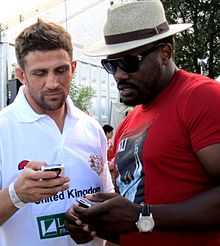Zimbabweans in the United Kingdom
| |||||||
| Total population | |||||||
|---|---|---|---|---|---|---|---|
|
Zimbabwean-born residents 49,524 (2001 Census) 122,00 (2010 ONS estimate) Population of Zimbabwean origin 200,000-500,000 (2006 community leader estimates) | |||||||
| Regions with significant populations | |||||||
| London · Luton · Leeds · Slough · Milton Keynes · Manchester · Birmingham | |||||||
| Languages | |||||||
| English · Shona · Ndebele | |||||||
| Religion | |||||||
| Protestantism · Catholicism. | |||||||
| Related ethnic groups | |||||||
| Black British · White people in Zimbabwe | |||||||
Zimbabweans in the United Kingdom are the group that consists of Zimbabwean-born people who have migrated to the UK as well as their British-born descendants. The Zimbabwean community in the UK is diverse, consisting of individuals of differing racial, ethnic, class, and political groups.[1] There are asylum seekers, refugees, labour migrants, students, undocumented migrants, and others who have gained British citizenship.[1]
History and settlement
The International Organization for Migration has characterised Zimbabwean migration to the UK as divided into three waves. The initial wave of significant Zimbabwean migration consisted of white Zimbabweans who migrated after the country's independence from Britain. The second major wave lasted from 1990 until 1997, caused by the economic hardship that resulted from Zimbabwe's application of the World Bank and International Monetary Fund's Structural Adjustment Programme. The third wave began in 1998 and has resulted from political and social unrest in Zimbabwe. Prior to November 2002, Zimbabweans were free to travel to the UK without a visa and this provided a route to political asylum. In November 2002 the UK government introduced the requirement for Zimbabweans to apply for visas in order to travel to the UK, making it more difficult for them to apply for asylum.[1] The number of Zimbabweans applying for asylum has fallen, and increasing numbers have sought refuge in South Africa instead.[2]
Demographics
Population
The majority of Zimbabweans in the UK are first-generation immigrants.[1] According to Census figures, in 1971 some 7,905 Zimbabwean-born people were living in the UK. This figure rose to 16,330 in 1981 and to 21,252 in 1991.[1] The 2001 UK Census recorded 49,524 Zimbabwean-born people residing in the UK.[3] The Office for National Statistics estimated that, in 2010, the figure of Zimbabwean-born people living in the UK has risen to 122,000.[4]
Unofficial estimates of the total Zimbabwean British population, including British-born people of Zimbabwean origin, vary significantly.[1] Numerous newspapers have speculated that the population might be as large as one million, including an estimate of 600,000 by The Observer in 2003,[1] but community organisations and leaders put the population in the range of 200,000 to 500,000.[1]
Spread and distribution
The Zimbabwean population is widely dispersed across the UK.[1] The largest communities can be found in the UK's larger cities and towns. The table below shows the geographic spread of Zimbabwean people in the UK in 2006, based on estimates by community leaders.[1]
| Estimated Zimbabwean population |
Location(s) |
|---|---|
| 40,000 | London |
| 20,000 each | Leeds, Luton |
| 10,000 each | Birmingham, Manchester, Milton Keynes, Sheffield, Slough |
| 5,000 each | Coventry, Glasgow, Leicester, Wolverhampton |
| 3,000 each | Edinburgh, Liverpool |
| 2,000 | Bristol |
| 1,000 each | Cardiff, Oxford |
Culture and community
Food
Sadza or Isitshwala This is Zimbabwe's staple food, similar to mashed potatoes. This is popularly served with beef and green leafy vegetables.
Notable people
- Brian Chikwava - writer and musician
- John Collins - former Chief Executive of Shell
- Chelsy Davy - Prince Harry's former girlfriend was born in Bulawayo
- Daniel Dumile - English born US rapper with Trinidadian and Zimbabwean parentage
- Duncan Fletcher - former coach of the English cricket team
- Simon Mugava - Zimbabwe Professional Cricketer. Represented Zimbabwe in a (World Cup) New Zealand
- Norman Geras - academic and authority on Marxism
- Bruce Grobbelaar - South African born footballer with British and Zimbabwean links
- Kubi Indi - development activist, businesswoman and actress
- Jamelia - Singer of Jamaican and Zimbabwean parentage
- Rise Kagona - guitarist for Bhundu Boys
- Kenny Chitsvatsva - drummer for Bhundu Boys
- Miles Maclagan - professional tennis player and coach
- Kuda Matimba - keyboardist/singer of Bhundu Boys
- Alexander McCall Smith - author and expert on medical law and bioethics
- Benjani Mwaruwari - Zimbabwean born footballer of Malawian decent
- Thandie Newton - actress of Zimbabwean descent
- Lewin Nyatanga - footballer of Zimbabwean and Welsh descent
- Rozalla - dancer of Zambian and English parentage
- Shingai Shoniwa - singer/bass player of Noisettes
- Ian Napa - British Bantamweight boxing champion
- Tendayi Jembere - Actor
- Graeme Hick - Zimbabwean born cricketer
- Dereck Chisora - Zimbabwean born World Heavyweight boxing champion
- Joseph Madyembwa - Former Zimbabwe National Cricket Team Computer Analyst and Mashonaland Eagles Team Manager
- Thando Fuzane- Former Miss Victoria Falls [1996]
See also
References
- ↑ 1.0 1.1 1.2 1.3 1.4 1.5 1.6 1.7 1.8 1.9 "Zimbabwe: Mapping Exercise" (PDF). London: International Organization for Migration. December 2006. Retrieved 6 April 2010.
- ↑ Cooley, Laurence; Rutter, Jill (2007). "Turned away? Towards better protection for refugees fleeing violent conflict". Public Policy Research 14 (3): 176–180. doi:10.1111/j.1744-540X.2007.00485.x.
- ↑ "Country-of-birth database". Organisation for Economic Co-operation and Development. Retrieved 4 October 2008.
- ↑ "Estimated population resident in the United Kingdom, by foreign country of birth (Table 1.3)". Office for National Statistics. Retrieved 26 December 2010.
| ||||||||||||||||||||||||||




